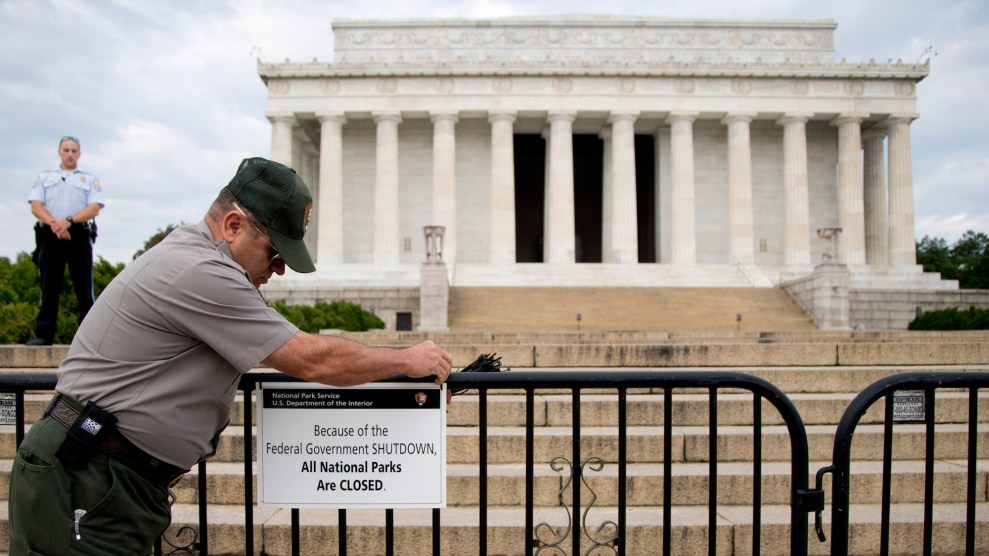
A National Park Service employee posts a sign on a barricade closing access to the Lincoln Memorial in Washington during the October 2013 government shutdown.Carolyn Kaster/AP
Saturday marks the one-year anniversary of the Trump presidency. If Senate leaders fail to reach a last-minute agreement on a spending bill, the federal government will celebrate the occasion with some time off. Though only about half of federal agencies have publicly shared up-to-date contingency plans, here’s a list of the people who can expect to join the estimated 850,000 furloughed federal employees in taking an unwelcome break:
- Patients out of options: The National Institutes of Health’s Clinical Center will stop admitting patients into its clinical trials. During the 2013 shutdown, 200 patients, including two dozen children with cancer, were unable to seek experimental treatment.
- Patients waiting on a cure: The NIH will stop accepting grant proposals, putting a hold on new medical research.
- Germophobes: The Centers for Disease Control will stop tracking the country’s disease outbreaks, and end its infection monitoring efforts at the nation’s airports.
- Prescription drug users: The FDA will discontinue efforts to keep drug labeling information accurate and up-to-date. The drug approval process will also experience delays.
- People with the flu: In 2013, the CDC shut down its annual seasonal influenza program. Should the same come to pass this time, it will happen during one of the worst flu seasons in recent memory.
- People who eat: The Food and Drug Administration, which oversees 80 percent of the nation’s food supply, will stop routine food plant safety inspections.
- Preschoolers from low-income families: Federal grants for Head Start programs, which provide early childhood education for almost a million low-income children, would lack funding should a shutdown continue into February.
- Army brats: Twelve hundred school districts rely on the Impact Aid, which provides $1.3 billion annually to supplement budgets for schools on tax-exempt federal lands like military bases. This funding could disappear if the government shuts down. Districts on Native American reservations will be similarly affected.
- Civil suit seekers: The Justice Department will scale back all civil litigation efforts. Bad news for Summer Zervos and AT&T.
- Businesses trying to employ workers from abroad: The Labor Department will stop processing work visas.
- Americans living near toxic hellscapes: The Environmental Protection Agency will cease work at Superfund sites, areas contaminated by hazardous waste and identified by the EPA for cleanup, unless doing so would create an “imminent” threat.
- People at risk of flooding: The FEMA Flood Risk Mapping program stops when the government shuts down.
- Workers at chemical sites: The Department of Homeland Security program that protects chemical sites would lose funding.
- Oil and gas explorers: The Bureau of Land Management will not process permits for oil and gas drilling on federal lands.
- Economists: The Bureau of Labor statistics stops releasing reports such as the monthly jobs report during a government shutdown. Ditto for the Bureau of Justice Statistics.
- Workers who fear for their physical safety: The Occupational Safety and Health Administration will stop routine workplace inspections and investigations.
- Specifically, miners: The same goes for the Mine Health and Safety Administration’s inspection efforts. Mine collapses will be addressed if any occur.
- Soldiers trying to pay their bills: Military personnel will continue to serve in their posts, but they likely won’t receive their paychecks, nor will they be able to request time off.
- Families of fallen soldiers: People who lose military relatives during the shutdown will not receive the Pentagon’s $100,000 death gratuity benefit.
- West Point students: Instructors at military academies don’t show up for class during a shutdown.
- Refugees: The US Refugee Admissions program will remain open, but the critical services necessary to process their applications, like the issuing of Social Security numbers, will discontinue. During 2013, the Obama administration stopped admitting refugees during the shutdown because of those difficulties.
- Would-be gun owners: The Bureau of Alcohol, Tobacco, Firearms and Explosives will not issue permits.
- Would-be homebuyers: The processing of home mortgages and similar loans will be delayed, as access to IRS verification services for Social Security numbers and income will not be running.
- Americans getting a jumpstart on their taxes: The IRS will send half its staff home during a government shutdown, leaving just a skeleton crew on hand to answer questions about the new tax code. The last shutdown delayed the processing of $4 billion in tax refunds.
- Middle schoolers on DC field trips: The Smithsonian museums close their doors to visitors starting Monday. (Just as well—the National Gallery of Art’s Vermeer exhibit ends on Sunday, anyway.)
- Panda panderers: Like the rest of the Smithsonian facilities, the National Zoo will be closed to visitors (and the feed to the beloved Panda Cam will be shut down). But don’t worry, PETA—the animals will still be fed.
- Outdoorsy types: The Trump administration says it will try to keep the national park sites open to visitors. The National Park Service staff, however, will be mostly absent, and campgrounds, full-service bathrooms, and other amenities will be closed.
- Tourists: Overseas consulates will be able to stay open for a limited period, thanks to the fees they collect in their work, but will eventually be forced to close, meaning people abroad may not get approval to travel to the United States.
- Sommeliers and cicerones abroad: The Treasury Department’s Alcohol and Tobacco Tax and Trade Bureau will stop issuing export certificates for beer, wine, and distilled spirits. More than two million liters of American-produced alcohol languished in US ports during the 2013 shutdown.
- Demographers: Preparation for the 2020 Census ceases.
And, for better or worse, here are a few groups that won’t be affected by a shutdown:
- Undocumented immigrants: The majority of Immigration and Customs Enforcement officials will stay on the job, as will most US Customs and Border Protection agents.
- Air travelers: TSA will continue all of its person- and bag-screening duties.
- Carnivores: The Agriculture Department will continue meat, poultry, and egg inspections.
- Women’s Marchers: While most National Park Service employees won’t report for duty, a special provision will ensure crowd control for First Amendment activities.
- Victims of natural disasters: The Disaster Relief Fund, which is funded outside of the annual spending process, will continue to provide resources for the cleanup of the Gulf Coast and Caribbean areas affected by Hurricanes Harvey, Irma, and Maria, as well as the wildfires that have devastated California.
- College students: The Department of Education will still process financial aid for the 13 million students who depend on it.
- Congress: Federal law ensures members of Congress continue to receive their paychecks.
- Steve Bannon: Special counsel Robert Mueller’s investigation into Russian interference in the 2016 election does not rely on annual funding appropriations.













